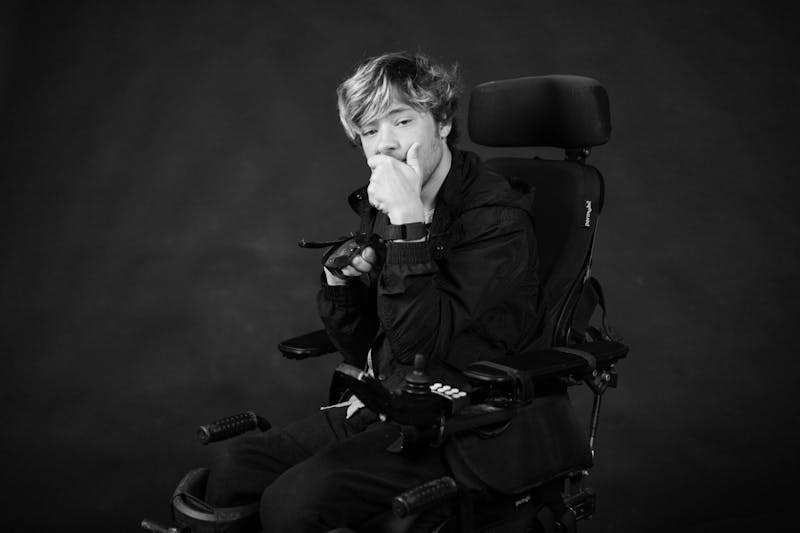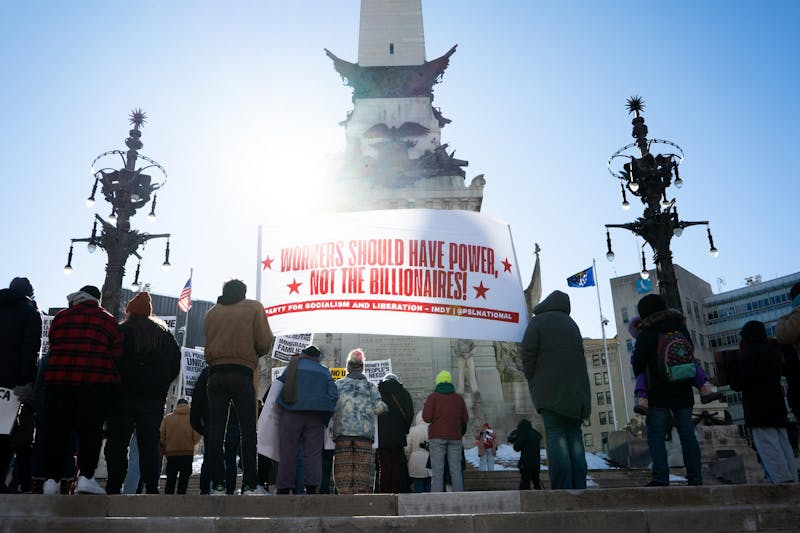Meghan Holt is a fourth-year journalism major and writes “Word Vomit” for the Daily News. Their views do not necessarily reflect those of the newspaper.
When I was a kid, I went to FAME camp at Camp Potawatomi back when they still hosted it there.
FAME, which stands for Foundation for Art & Music in Education, taught me about all things art, and each year we put on a themed performance at the end of our week-long overnight stay for the parents who had poured their wallets into this education. During my fourth-grade year, our theme was about celebrating Indiana.
We had to learn Ballard McDonald and James Hanley’s song “Back Home Again in Indiana” for this performance. I still know all the words.
In high school, my marching band belted the same song as we advanced to the football field to put on our pre-game performance. I always tried to sing the loudest.
There was a real sense of pride I felt to sing about my state — to imagine the twinkling candle flames through those mythical sycamore trees and to look out across the countless fields around me and understand what McDonald and Hanley meant when they wrote about the smell of new-mown hay.
I still have a deep love for Indiana. It’s not quite where I was born (that honor goes to Aurora, Illinois), but it’s where I was raised. I’m a Hoosier at heart. At least I like to think I am.
But I’m not so sure anymore.
What I haven’t told you yet is that I’m a gay, transgender person. As I’ve become more comfortable in my own identity, I’ve become less comfortable in my home state.
So, I’m leaving.
Indiana lawmakers often express a desire to minimize the brain drain of newly graduated young people leaving the state. With about 5.1 percent of adults younger than 30 in the U.S. identifying as transgender or nonbinary, according to the Pew Research Center, and a whole slew of Indiana legislation and politicians targeting the queer community, my advice to those lawmakers is to reassess which policies need to be acted on to make young people stay.
As of writing, according to the Movement Advancement Project and the ACLU, Indiana bans “best practice medication and surgical care for transgender youth” through SB 480; requires teachers to out students and enforces a “don’t say gay” policy in schools via HB 1608; and censors books in schools by virtue of SB 12 (although it was signed into law after being amended to HB 1447) — a practice that “[has] historically been used to ban books related to LGBTQ+ topics.”
These are only a few examples of the bills that have been signed into law in Indiana one way or another. These bills directly affect my life. It’s strange to me to see bills like these be signed into law and the next day be asked by a policymaker what they could do to make me or my peers stay local.
The debates about whether trans people were allowed to exist here or not — about whether I should be allowed to exist or not — made my already anxious mind spiral out of control.
According to the Trevor Project, “86 percent of transgender and nonbinary youth say recent debates about state laws restricting the rights of transgender people have negatively impacted their mental health. A majority of those trans youth (55 percent) said it impacted their mental health ‘very negatively.’”
This was my reality. About this time last year, I referred myself to a therapist for an anxiety spike that coincided with my realizing my trans identity.
I couldn’t go out on my own.
At the grocery store, I chose paths that put me in contact with as few people as possible, even if they were convoluted. I broke off a relationship of five years and refused to speak to my family about it for six months because it was so inextricably linked to my being transgender, and I didn’t know what their reaction would be.
I was nervous, unhappy, jumpy and assumed the worst of strangers who stared too long.
For these problems, my former (albeit well-meaning) therapist proposed I move to New York.
I laugh about it now — and my coworker got me a little New York City Lego set to commemorate the incident — but my therapist’s words held a pearl of truth.
As long as anti-LGBTQ+ laws are active, Indiana is not a state where I can comfortably be queer.
I don’t mean to discredit the amazing queer organizations that hold strong in Indiana. OUTReach, Spectrum, Indiana Youth Group and many more similar organizations do a great job making safe spaces for LGBTQ+ people — whether they are youth or adults. I’m immensely happy they exist and immensely grateful for the hard work they do.
We are strong. We are not going anywhere. These groups are proof of that.
But it’s too much for me to have this transphobic Sword of Damocles hanging over my head. Gender-affirming healthcare for youth has already been banned in Indiana. Could gender-affirming healthcare for adults be next on the chopping block?
LGBTQ+ organizations cannot be the sole source of support for our community. If lawmakers want young people to remain in Indiana, they need to support the LGBTQ+ community at an institutional level.
Let’s start with transgender healthcare. According to GLAAD, more than 30 major medical associations support gender-affirming medical care for transgender people and youth. Allowing transgender people access to this care is considered best practice.
Currently, Indiana outlaws best-practice medical care for transgender youth. Lifting this ban would not only allow young trans people access to life-saving care but would also grant more decision-making autonomy to them, their families and their physicians. This would be a great first step in making transgender Hoosiers feel more comfortable here.
Next, educating individuals about LGBTQ+ identities in school would be invaluable to reducing hate towards this marginalized group.
In my anecdotal experience, coming out to family and friends has often changed their attitudes about LGBTQ+ individuals in a positive way. While it certainly won’t be true of everyone, I think a reasonable person just needs an example of a trans person in their own life to challenge negative biases they might have absorbed through social media, television or the movies.
If schools are granted the ability to teach individuals about the LGBTQ+ community, I believe the negative stigmas surrounding our lives would change.
The National Library of Medicine agrees with that ideology. In a case study about the effects of anti-stigma education campaigns about mental illness in Europe, they found that two years after the campaign, the percentage of individuals who held negative stigmas surrounding mental health had dropped.
In short, education combats hate.
There will always be a piece of me that longs for my Indiana home. But I cannot live here as long as anti-LGBTQ+ legislation denies us the same rights as our cisgender, heterosexual peers; as long as Indiana seeks to censor our histories and identities from school shelves; as long as schools must out their LGBTQ+ students and put them at severe risk.
It is my hope that one day I’ll be able to comfortably return and see the moonlight gleaming on the Wabash River. Until then, I urge Indiana lawmakers to do better by and for their LGBTQ+ constituents.
Contact Meghan Holt with comments at mlholt@bsu.edu.





The Daily News welcomes thoughtful discussion on all of our stories, but please keep comments civil and on-topic. Read our full guidelines here.